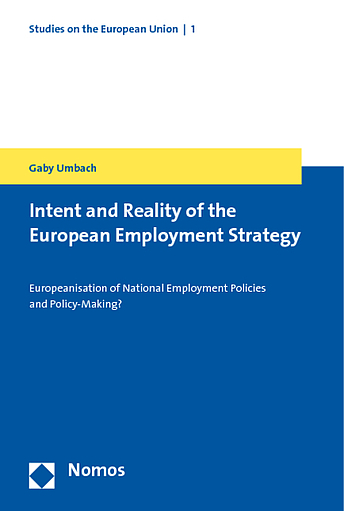englischWith its characteristics as a new mode of governance – such as mutual policy learning, exchange of best practices or peer review – the European Employment Strategy (EES) and the Open Method of Coordination (OMC) applied with it confront political actors within the EU with the new rules of policy coordination that also impact on governance structures within the European Multilevel System.
The present book intensively deals with the different facets of the EES, analysing its original intent and its political reality. In doing so, it goes beyond present monographs on the EES as it not only focuses on its genesis, development, and characteristics. In a highly elaborated and profound theory-based in-depth analysis, it examines the impact of the strategy on political structures, employment policies, and underlying ideas as well as the interplay of the EES with other supranational economic policies. In addition to the EU level, the United Kingdom and Germany serve as case studies for the analysis of adaptation at member state level. In order to critically assess their applicability and validity in the given case, the book embeds this impact analysis into the academic debate on Europeanisation and policy convergence. By doing so, it complements Europeanisation studies on regulatory policies by analysing the Europeanisation potential and impact of soft policy coordination within the European Multilevel Governance System.
Mit ihren spezifischen Merkmalen als neues Politikinstrument – wie etwa ihrem rechtlich nicht bindenden Charakter, dem Ziel des gegenseitigen Politiklernens durch Austausch bester Praktiken oder gemeinsamen Evaluierungsprozessen – stellt die Europäische Beschäftigungsstrategie (EBS) und die mit ihr Anwendung findende Offene Methode der Koordinierung (OMK) beschäftigungspolitische Akteure in der EU vor die neuen Herausforderungen von Politik-Koordinierung, die die Politikgestaltung im europäischen Mehrebenensystem neu prägen.
Das vorliegende Buch beschäftigt sich intensiv mit diesen unterschiedlichen Facetten der EBS und ihrer Wirkung. Es geht dabei über bisherige Einzelstudien zur EBS hinaus und befasst sich nicht nur mit deren Entstehung, Entwicklung und Merkmalen. Es kontrastiert vielmehr den eigenen Anspruch der EBS mit ihrer politischen Realität und untersucht theoretisch hoch reflektiert deren Einfluss auf Politik-Koordinierungsstrukturen, Beschäftigungspolitiken und zugrunde liegenden Ideen sowie deren Zusammenspiel mit anderen wirtschaftspolitischen Bereichen. Neben der EU-Ebene dienen Großbritannien und Deutschland als Fallbeispiele für mitgliedstaatliche Anpassungsprozesse. Das Buch verankert seine Wirkungsanalyse sehr fundiert in der wissenschaftstheoretischen Debatte um Europäisierung und Politikkonvergenz, um deren Anwendbarkeit im Falle der EBS kritisch zu analysieren. Es komplettiert damit Europäisierungsstudien zu regulativer Politik durch die Analyse des Einflusses weicher Politik-Koordinierung im europäischen Mehrebenensystem.


